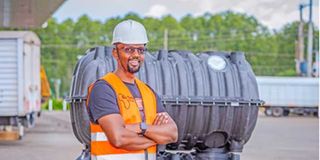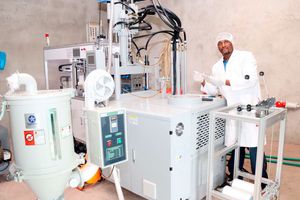
Edwin Kirugo is the founder of Bio Tank Africa, a Thika-based company that produces plastic bio digesters and bio digester enzymes.
In February 2018, after two years of building a house in Thika, Edwin Kirugo felt that it was finally time to move his young family from a rental unit, to a place that they could call their own.
However, even though most of the construction works were complete, Edwin could not move his family as he did not have enough money to set up a septic tank, which was needed to manage the waste in the home.
“Advanced economies have good sewer lines to manage home waste, but in Kenya, the sewer lines are not very good, and you are required to managed your waste on site, hence the need for either a septic tank, pit latrine or bio digester,” explains Kirugo.
Based on the foreman’s calculations, the total cost of setting up a septic tank would amount to over Sh240,000, not including the cost of excavation, which would vary depending on the conditions of the site.
“Here I was wanting to move into the house but I couldn’t because I could not finance the septic tank, so I started calling hardware stores that had advertised bio digesters on their posters, which had been recommended by my foreman as a cheaper alternative,” said Kirugo.
It took the entrepreneur a month to find someone who could set up a concrete bio digester in his home, and when he finally did, the final quotation for setting up one did not amount to more than Sh100,000.
“When they were setting up the bio digester, it looked easy, and this got me wondering why it took a whole month to find someone who could set it up for me,” says Kirugo.
Earlier in his career, he had made a promise to himself that by the time he would stop paying rent, he would also stop working for someone else and set up his own business.
“Therefore, immediately they finished setting up the bio digester, I went to a cyber café to register Bio Tank Africa, a company involved in the production and installation of plastic bio digesters,” remarks Kirugo.
The entrepreneur then sent in a notice to his place of work, where he served as a branch manager, that he would no longer be working there, as he needed to now focus on growing his business.
What he had not anticipated is how difficult it would be to get his first client, finally getting one six months later.
“With a young family at the time that was used to a certain lifestyle, I would go from one construction site to another, approaching the owner or contractor, and telling them the services I offer,” notes Kirugo.
When he finally got his first client, he had to settle for a very small profit margin, but this was enough to keep the dream going, and two months later, he got a bigger assignment, an estate with 15 townhouses, each of which needed a bio digester.
“We were lucky to win the contract against very strong opponents, but now the challenge was that we had never handled a project of such scale before,” he points out.
At the time, the entrepreneur did not even have enough money to get a bus from Thika to where the construction site was, let alone money to purchase cement for a project valued at around Sh1.5 million.
“Normally, what most contractors do is use a deposit paid by the client to purchase materials, but in our case, the client preferred to pay upon delivery of work, as they had been duped before,” explains Kirugo.
By the time a project owner reaches out to a consultant for waste water management services, normally they have completed most of the construction works, therefore this owner was counting on Kirugo to deliver, so that he could hand over the units to buyers.
“A few weeks into the contract, I had not delivered, so the director called me to find out what was going on. At this point I had to tell him that I was unable to proceed because I had no money to work with,” poses Kirugo.
Fortunately, the client was willing to make a down payment not in the form of cash, but in the form of supplies, so he sent in an inventory list, got the materials, assembled a team for excavation and got to work.
Delivering on this project boosted his confidence levels, as he was able to pay off his debts, pay his workers and prove to future clients that he had the capacity to handle large projects.
However, he still felt that the cost of setting up a concrete septic tank was too high, and an alternative was needed, as concrete was not economically viable for both the client and the contractor.
“I thought of plastic as a viable alternative to concrete, because plastic is cheaper and equally durable, but when I shared the idea with my mentors in the industry, they kept dismissing me.”
This did not stop the entrepreneur from developing a prototype, which he sent to a manufacturing partner in China, to start producing.
“The challenge here was that the factory had a condition of minimum order quantity, again we got stuck because we had no money to pay for the order and the banks did not want to finance an experiment.”
Again, the entrepreneur took a leap of faith and put out ‘coming soon’ adverts, hoping to get clients who would entrust him with their money and wait for the biodigesters to arrive.
Fortunately, six clients trusted them with their money without seeing a proof of concept, and a few months later, despite some setbacks at customs, they were able to deliver.
“We later made an order of 50 plastic biodigesters and sold all of them. This really helped to remove the doubts which the market might have had that the concept does not work,” he says.
To bring the cost of setting up a biodigester even lower, he also thought of how to bring the cost of enzyme, which is a product used in a biodigester to separate solid waste from liquid waste, lower.
“When I came into the business, it was very difficult to get the enzyme, due to its scarcity, people would sell a one kilogram bag at Sh15, 000 and even at that price, it was still difficult to find one.”
The entrepreneur was lucky to meet an environmental biologist, who agreed to join his small business and start producing an enzyme called Bioclean Septic, which he started to sell at a much lower price, amidst threats from people claiming that he was interfering with their business.
It has now been nearly six years since the company began producing their own plastic biodigesters as well as kitchen grease traps, and Kirugo says that they have had only one incident where the products failed.
“The challenge comes when the usage of the facility exceeds the recommended figure. For instance, one of our clients, a hotel in Naivasha, once received an unusually high number of guests and we had to decommission their bio digester after it failed,” said Kirugo.
The company, which has a lean team of about six staff in their two branches in Thika and Ruiru, plans to open more branches countrywide, to enhance customer support and distribution to clients not only in Kenya but the larger Eastern African region as well.






